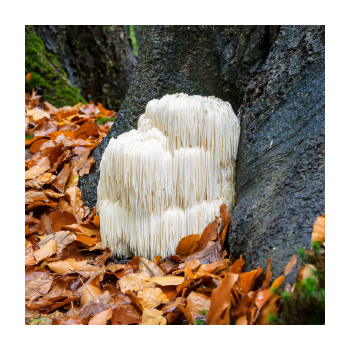


Sign-up for {N}power to get exclusive discounts, newsletters, members-only features, and more!
 Denver - Design District - Alameda and Broadway
Denver - Design District - Alameda and Broadway
368 S Broadway
Denver, CO 80209
United States
 Preferred Store:
Select a Store
Preferred Store:
Select a Store

Evidence is mounting for the cognitive and mood-boosting effects of lion’s mane mushroom supplements, however studies in young, healthy adults are limited. A 2023 study1 aimed to change that by analyzing the short and long-term effects of lion’s mane supplements in 43 young and healthy adults. The participants, aged 18-45, were randomized into two groups and given a placebo or 1.8 grams of a lion’s mane mushroom extract for 28 days.
 To assess the short-term effects of the lion’s mane extract, the participants were given several cognitive function tests at the start of the study and then given the treatment (either the lion’s mane extract or placebo) immediately following. After a 60-minute absorption period, they were given another cognitive function test to compare the results. While there were no significant benefits for participants taking the lion’s mane extract for two of the three tests, the researchers found participants taking the lion’s mane’s extract performed significantly faster on one of the tests measuring executive function (this includes things like working memory, attention, organization, planning, etc).
To assess the short-term effects of the lion’s mane extract, the participants were given several cognitive function tests at the start of the study and then given the treatment (either the lion’s mane extract or placebo) immediately following. After a 60-minute absorption period, they were given another cognitive function test to compare the results. While there were no significant benefits for participants taking the lion’s mane extract for two of the three tests, the researchers found participants taking the lion’s mane’s extract performed significantly faster on one of the tests measuring executive function (this includes things like working memory, attention, organization, planning, etc).
Long-term effects of taking the lion’s mane extract were examined by comparing a stress assessment at the start of the study to one taken after the full 28-day treatment period. The researchers found participants taking the lion’s mane extract had significantly lower stress scores by the end of the study. The researchers conclude that the cognitive and mood-enhancing effects of lion’s mane may be due to its effect on neuronal plasticity (promoting brain cell growth and connectivity) as well as its anti-inflammatory effects.
 New research from the University of Maryland School of Public Health shows that regular walks strengthen connections between brain networks important for clear thinking and memory. Published in the Journal of Alzheimer’s Disease Reports in 20232, the study included 33 participants between the ages of 71 and 85 years who walked for 30 minutes on a treadmill four days per week for 12 weeks. At the beginning and end of the study, researchers asked participants to read a short story and then repeat it out loud with as many details as possible.
New research from the University of Maryland School of Public Health shows that regular walks strengthen connections between brain networks important for clear thinking and memory. Published in the Journal of Alzheimer’s Disease Reports in 20232, the study included 33 participants between the ages of 71 and 85 years who walked for 30 minutes on a treadmill four days per week for 12 weeks. At the beginning and end of the study, researchers asked participants to read a short story and then repeat it out loud with as many details as possible.
Additionally, participants completed functional magnetic resonance imaging (fMRI) to measure the change in communication within and between three different brain networks responsible for controlling cognitive function. The brain networks studied typically show deterioration in people with mild cognitive impairment and Alzheimer’s disease. Eventually, these networks become disconnected, and as a result, people experience a decline in mental abilities like memory, reasoning, and judgement. Researchers in this study showed that after 12 weeks of regularly walking, participants had significant improvements in story recall abilities and also showed brain activity that was more synchronized and stronger, demonstrating that walking caused the brain to change and adapt in a positive way.



Sign-up for {N}power to get exclusive discounts, newsletters, members-only features, and more!
